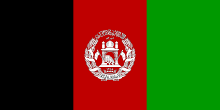
Afghanistan, officially the Islamic Emirate of Afghanistan, is a landlocked country located at the crossroads of Central Asia and South Asia. Referred to as the Heart of Asia, it is bordered by Pakistan to the east and south, Iran to the west, Turkmenistan to the northwest, Uzbekistan to the north, Tajikistan to the northeast, and China to the northeast and east. Occupying 652,864 square kilometers (252,072 sq mi) of land, the country is predominantly mountainous with plains in the north and the southwest, which are separated by the Hindu Kush mountain range. Kabul is the country's largest city and serves as its capital. According to the World Population review, as of 2023, Afghanistan's population is 43 million. The National Statistics Information Authority of Afghanistan estimated the population to be 32.9 million as of 2020.

The Taliban, which also refers to itself by its state name, the Islamic Emirate of Afghanistan, is an Afghan political and militant movement with an ideology comprising elements of Pashtun nationalism and the Deobandi movement of Islamic fundamentalism. It ruled approximately 75% of Afghanistan from 1996 to 2001, before it was overthrown by an American invasion after the September 11th attacks carried out by the Taliban's ally al-Qaeda. The Taliban recaptured Kabul in August 2021 following the departure of coalition forces, after 20 years of Taliban insurgency, and now controls the entire country. The Taliban government is not recognized by any country and has been internationally condemned for restricting human rights, including women's rights to work and have an education.

The 1988 Summer Olympics, officially the Games of the XXIV Olympiad and officially branded as Seoul 1988, were an international multi-sport event held from 17 September to 2 October 1988 in Seoul, South Korea. 159 nations were represented at the games by a total of 8,391 athletes. 237 events were held and 27,221 volunteers helped to prepare the Olympics.

Afghanistan sent a delegation to compete at the 2004 Summer Olympics in Athens, Greece, which were held from 13 to 29 August 2004. This was the eleventh appearance of the nation in the Summer Olympics and their first since their reinstatement to the International Olympic Committee in 2003 following a four-year ban due to the Taliban government's discrimination against women and their opposition to them playing sports. The delegation consisted of five athletes: sprinters Masoud Azizi and Robina Muqimyar, boxer Basharmal Sultani, judoka Friba Rezayee and wrestler Bashir Ahmad Rahmati. Muqimayar and Rezayee's inclusion in the Afghan delegation marked the first time the country sent a woman athlete to a Summer Olympics. All five failed to progress any further than the preliminary round of their respective sports and Afghanistan's best performance at the Games was by Muqimayar who set a new national women's 100 metre record in her heat.

The 1951 Asian Games, officially known as the First Asian Games, was a multi-sport event celebrated in New Delhi, India from 4 to 11 March 1951. The Games received names like First Asiad, 1951 Asiad, and New Dehli 1951. A total of 489 athletes representing 11 Asian National Olympic Committees (NOCs) participated in 57 events from eight sports and discipline. The Games was the successor of the Far Eastern Games and the revival of the Western Asiatic Games. The 1951 Asiad were originally scheduled to be held in 1950, but postponed until 1951 due to delays in preparations. On 13 February 1949, the Asian Games Federation was formally established in Delhi, with Delhi unanimously announced as the first host city of the Asian Games.

The 2002 Asian Games, officially known as the XIV Asian Games and also known as Busan 2002, were an international multi-sport event held in Busan, South Korea from September 29 to October 14, 2002. Due schedule impediments the football tournament started two days before the opening ceremonies.

The Olympic Council of Asia (OCA) is a governing body of sports in Asia, currently with 45 member National Olympic Committees. Talal Fahad Al-Ahmad Al-Sabah was elected as President of the OCA on 8 July 2023. However, on 30 July 2023, the International Olympic Committee (IOC) asked Randhir Singh to continue as the Acting President of the OCA while the IOC investigated the OCA presidential election of 2023. On 13 October 2023, the IOC ethics committee asked the OCA to annul its 2023 elections due to Talal’s candidacy not fulfilling the eligibility conditions defined by the OCA Constitution and election interference by his brother Ahmad Al-Fahad Al-Sabah.
Zhang Guozheng is a Chinese weightlifter. Zhang is a World champion, Olympic champion and World Record holder. In January, 1999, Zhang Guozheng was named a member of the National Men's weightlifting team. He ranked fourth at the Sydney Olympic Games in 2000 in the 69 kg class. On October 3, 2002, at the Busan Asian Games, Zhang Guozheng took gold in the 69 kg class with a total score of 345 kilograms. In 2004, Zhang Guozeng won the Athens Olympic Games in the 69 kg class champion. On December 3, 2006, at the 15th Asian Games, Zhang Guozheng totaled 336 kg for a gold medal with a 152 kg snatch and a 184 kg clean and jerk. Zhang retired after 2008 and now serves as the deputy head coach for the men's weightlifting team.
Saleh Mohammad Saleh is a former professional snooker player from Afghanistan. He represented Pakistan between 1988 and 2006. He reached the final of the IBSF World Snooker Championship in 2003 and won two medals at 2002 Asian Games.

Afghanistan has competed in 15 Summer Games. They have never appeared in any Winter Games. The country made its first appearance at the Berlin Games in 1936. It has sent a delegation to 14 of the 19 subsequent Summer Games since then. It is organised by the National Olympic Committee of the Islamic Republic of Afghanistan. The Committee is currently in exile and presided by Hafizullah Wali Rahimi: the International Olympic Committee has not recognized the Taliban regime's Committee, headed by Nazar Mohammad Mutmaeen.
Mullah Abdul Salam Rocketi is a former mujahideen "freedom fighter" and Taliban military commander who renounced his allegiance to run for the Parliament of Afghanistan in 2005, and for the Presidency in 2009. The Asia Times described him as one of the former Taliban who "... act as the Taliban's political wing in Kabul." Rocketi is an ethnic Pashtun from Zabul Province in Afghanistan. Son of Haji Manzar, he had almost completed his religious studies before he joined the mujahedeen war against the foreign invaders.

Afghanistan is a member of the Central Asian Zone of the Olympic Council of Asia (OCA), and has participated in the Asian Games since their inception in 1951. The National Olympic Committee of the Islamic Republic of Afghanistan, established in 1935 and recognised by the International Olympic Committee in 1936, is the National Olympic Committee for Afghanistan.

South Korea was the host nation of the 2002 Asian Games held in Busan from September 29 to October 14, 2002. South Korea was represented by the Korean Olympic Committee, and the South Korean delegation was the largest in this edition of the Asian Games. The delegation of 1,008 people included 770 competitors – 460 men, 310 women – and 238 officials. North Korea competed for the first time in an international sporting event hosted by South Korea. Both nations marched together at the opening ceremony with a Korean Unification Flag depicting the Korean Peninsula as United Korea.

The 2002 Asian Games was a multi-sport event held in Busan, South Korea from September 29 to October 14, 2002. Busan was the second South Korean city to host the Games, after Seoul in 1986. A total of 6,572 athletes—4,605 men and 1,967 women—from 44 Asian National Olympic Committees (NOCs) participated in 38 sports divided into 419 events. The number of competing athletes was higher than the 1998 Asian Games, in which 6,544 athletes from 41 NOCs participated. It was the first time in the history of the Asian Games that all 44 member nations of the Olympic Council of Asia (OCA) participated in the Games. Afghanistan returned after the fall of the Taliban government in the midst of ongoing war; East Timor, newest member of the OCA made its debut; and North Korea competed for the first time in an international sporting event hosted by South Korea. Both nations marched together at the opening ceremony with a Korean Unification Flag depicting the Korean Peninsula as United Korea.

North Korea participated in the 2002 Asian Games held in Busan, South Korea, from September 29 to October 14, 2002. Their participation marked their sixth Asian Games appearance. The North Korean delegation consisted of 318 people. North Korean athletes won total nine gold, eleven silver, and thirteen bronze medals. North Korea finished ninth in the final medal table standings.

East Timor competed in the 2002 Asian Games held in Busan, South Korea, from September 29 to October 14, 2002. East Timor was the newest Asian country—it declared its independence four months before the Games on May 20, 2002—and participated in the Asian Games for the first time after the independence from Indonesia. Indonesia invaded the nation on December 7, 1975, and left in October 19, 1999 after the UN-supervised referendum.
Roia Zamani is a taekwondo practitioner from Afghanistan, who is perhaps best known for her bronze medal finish at the 2002 Asian Games held in Busan, South Korea. Zamani, who wears a headscarf under her helmet, won a bronze medal in the 72 kg middleweight class of taekwondo without winning a single match. Zamani was the only medalist from Afghan side. None of the remaining athletes advanced past the qualifying stages.
The women's 5000 metres competition at the 2002 Asian Games in Busan, South Korea was held on 12 October at the Busan Asiad Main Stadium.
The women's 1500 metres competition at the 2002 Asian Games in Busan, South Korea was held on 10 October at the Busan Asiad Main Stadium.

The Afghanistan women's national volleyball team represents Afghanistan in international women's volleyball competitions and friendly matches.










